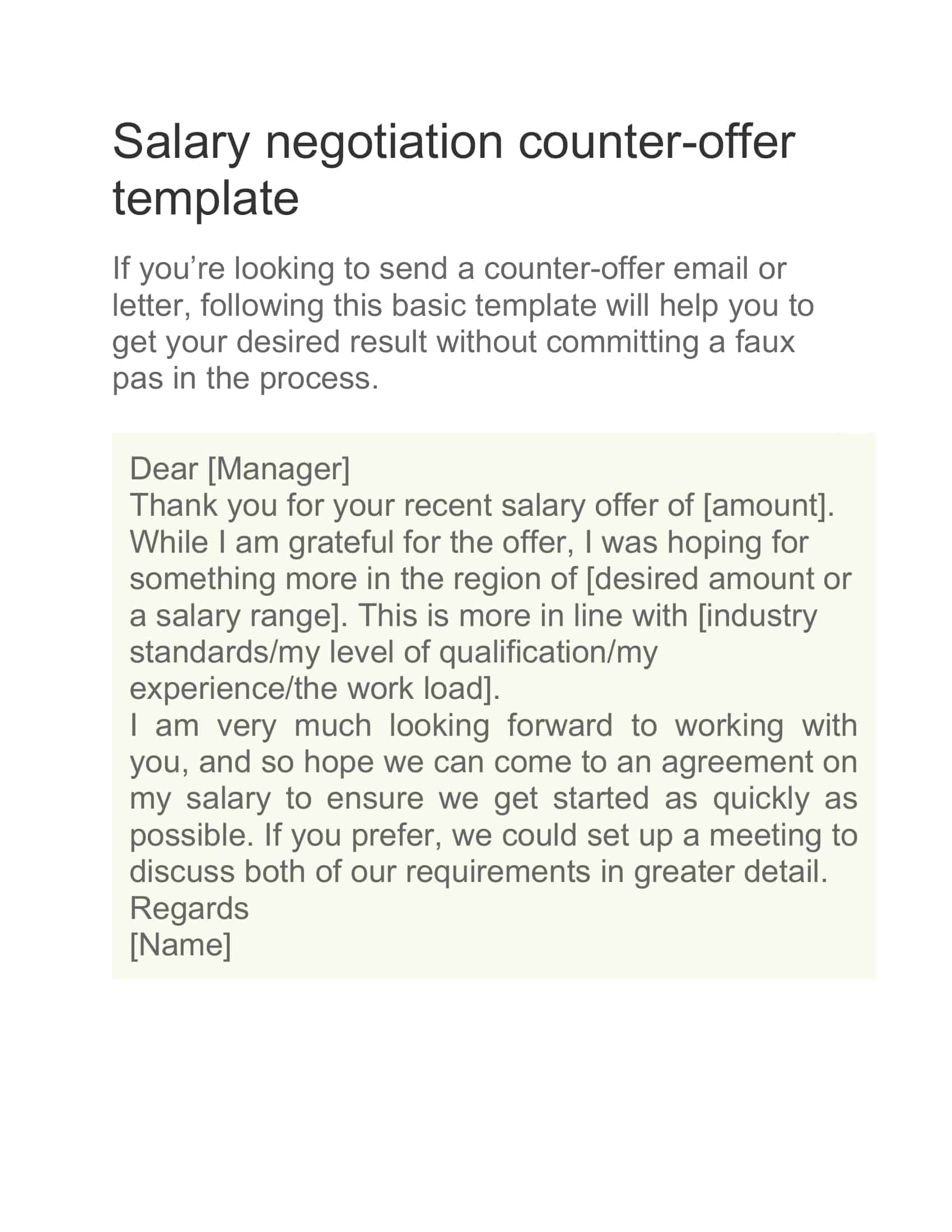Responding To A 'Best And Final' Job Offer: A Guide To Negotiation

Table of Contents
Understanding the "Best and Final" Offer
What it Really Means:
The term "best and final offer" is often used as a negotiating tactic. It's designed to put pressure on you and discourage further negotiation. However, it doesn't always mean the employer is completely unwilling to budge. They might simply be trying to gauge your level of interest and commitment. The key is to approach it strategically, understanding that their "finality" might be more of a negotiating position than an absolute truth.
- It's a negotiating tactic, not always a hard stop. Many companies use this phrase to try to end negotiations quickly.
- Assess your leverage: How much does the company really want you? If you're a highly sought-after candidate with in-demand skills, you have more leverage. If you've excelled through the interview process and are a clear fit for the role, your negotiating power is higher.
- Consider the overall package beyond salary. Don't focus solely on the base salary. Look at the entire compensation package—benefits, bonuses, vacation time, and other perks—to assess its overall value.
Evaluating Your Current Offer
Analyze the Compensation Package:
Before responding, thoroughly analyze the entire job offer. Break it down into its individual components and evaluate each one against your expectations and market research.
- Compare the offer to your research: Use online resources and salary surveys to determine the market rate for your role and location. Sites like Glassdoor, Salary.com, and Payscale can provide valuable data for salary negotiation.
- Consider the long-term value of benefits and perks: Don't just focus on the annual salary. Factor in the value of health insurance, retirement contributions, paid time off, and other benefits. These can significantly impact your overall compensation.
- Identify areas for potential negotiation (beyond base salary): Think about what aspects you could realistically negotiate. This could include a signing bonus, enhanced benefits, flexible work arrangements, or professional development opportunities.
Strategically Responding to a "Best and Final" Offer
Responding with Confidence and Diplomacy:
Crafting a thoughtful response is crucial. You need to express gratitude while also assertively addressing areas where the offer doesn't fully meet your expectations.
- Express gratitude for the offer: Begin by acknowledging their offer and expressing your enthusiasm for the opportunity. This sets a positive and professional tone.
- Highlight your value and contributions: Subtly remind them of your skills and experience and how you would contribute to their company's success. This reinforces your worth.
- Politely address areas where you feel the offer falls short: Don't be demanding, but clearly and confidently state your concerns. For example: "While I'm very excited about the opportunity, I was hoping for a slightly higher salary considering my experience in project management and data analysis." or "The benefits package is comprehensive, but based on my research of market standards for similar roles, I was hoping for a contribution to my professional development fund."
Negotiating Specific Aspects of the Offer (Beyond Salary)
Focus on Non-Salary Benefits:
Often, there's room to negotiate aspects beyond just your base salary.
- Signing bonus: A one-time payment to incentivize you to accept the offer.
- Relocation package: If you're relocating, negotiate for assistance with moving expenses.
- Performance-based bonuses: Negotiate for performance-based bonuses tied to measurable objectives.
- Professional development opportunities: Request a budget for conferences, training courses, or certifications.
- Flexible work arrangements: Inquire about the possibility of remote work options or flexible work hours.
Knowing When to Walk Away
Recognizing Your Limits:
While negotiation is important, you also need to know when to walk away.
- Don't undervalue yourself: Know your worth and don't settle for less than you deserve.
- Consider the company culture and overall job satisfaction: A slightly lower salary might be acceptable if the company culture and job satisfaction are excellent.
- Be prepared to walk away if the terms aren't acceptable: Sometimes, accepting a less-than-ideal offer isn't worth it in the long run.
Conclusion
Responding to a "best and final" job offer doesn't have to be daunting. By carefully analyzing the offer, understanding your leverage, and strategically negotiating, you can significantly improve your overall compensation package. Remember to consider the whole picture—salary, benefits, and overall job satisfaction. Don't let a "best and final" job offer intimidate you. Use this guide to effectively navigate salary negotiations and secure the best possible deal for your career. Master the art of job offer negotiation and confidently respond to your next "best and final" offer!

Featured Posts
-
 Strongest Horoscopes For March 20 2025 5 Zodiac Signs
May 23, 2025
Strongest Horoscopes For March 20 2025 5 Zodiac Signs
May 23, 2025 -
 Vklad Eleny Rybakinoy V Razvitie Zhenskogo Tennisa V Kazakhstane
May 23, 2025
Vklad Eleny Rybakinoy V Razvitie Zhenskogo Tennisa V Kazakhstane
May 23, 2025 -
 Indian Wells 2025 Swiatek And Rybakina Reach Fourth Round
May 23, 2025
Indian Wells 2025 Swiatek And Rybakina Reach Fourth Round
May 23, 2025 -
 Ingressos Atlantida Celebration Nando Reis Armandinho Di Ferrero Em Santa Catarina
May 23, 2025
Ingressos Atlantida Celebration Nando Reis Armandinho Di Ferrero Em Santa Catarina
May 23, 2025 -
 Cat Deeley Shares Rare Photo Of Her Twin Sons In Zara Outfits
May 23, 2025
Cat Deeley Shares Rare Photo Of Her Twin Sons In Zara Outfits
May 23, 2025
